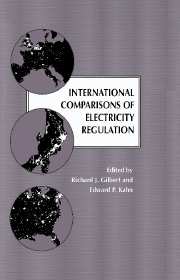Book contents
- Frontmatter
- Contents
- Preface
- International Comparisons of Electricity Regulation
- 1 Introduction: International comparisons of electricity regulation
- 2 Regulation, public ownership and privatisation of the English electricity industry
- 3 How should it be done? Electricity regulation in Argentina, Brazil, Uruguay, and Chile
- 4 From club-regulation to market competition in the Scandinavian electricity supply industry
- 5 Competition and institutional change in U.S. electric power regulation
- 6 The Japanese electric utility industry
- 7 Regulation of the market for electricity in the Federal Republic of Germany
- 8 The evolution of New Zealand's electricity supply structure
- 9 Regulation of electric power in Canada
- 10 The French electricity industry
- 11 The Yugoslav electric power industry
- Index
Preface
Published online by Cambridge University Press: 21 March 2010
- Frontmatter
- Contents
- Preface
- International Comparisons of Electricity Regulation
- 1 Introduction: International comparisons of electricity regulation
- 2 Regulation, public ownership and privatisation of the English electricity industry
- 3 How should it be done? Electricity regulation in Argentina, Brazil, Uruguay, and Chile
- 4 From club-regulation to market competition in the Scandinavian electricity supply industry
- 5 Competition and institutional change in U.S. electric power regulation
- 6 The Japanese electric utility industry
- 7 Regulation of the market for electricity in the Federal Republic of Germany
- 8 The evolution of New Zealand's electricity supply structure
- 9 Regulation of electric power in Canada
- 10 The French electricity industry
- 11 The Yugoslav electric power industry
- Index
Summary
When we began the research that has led to this book, we did not realize that reform of the electricity industry would become a worldwide phenomenon. The experiments in the U.K. were in their early stages, and the restructuring activities in Chile and New Zealand, to the extent they were known at all, were thought to be isolated, rather than seminal activities. Although intended as a largely academic inquiry into the nature and performance of alternative regulatory institutions, our efforts acquired a measure of direct relevance with the recent international movement to privatize, deregulate, and re-regulate electric power and other infrastructure industries.
The team of investigators assembled in this project was drawn largely from the economics profession, reflecting our particular interests in the economic determinants and outcomes of regulation. The country studies reflect the growing recognition that competition is feasible in significant segments of the industry. Yet the authors also appreciate that the electric power industry is beset with the traditional monopoly regulation problems of increasing returns and information asymmetries, which make it difficult to achieve the benefits of competition. These chapters also illustrate how variations in national experience, endowments, traditions, and political constraints have shaped existing institutions and how they are likely to affect the prospects for regulatory reforms.
Our efforts started in 1990 with the task of assembling an international team to investigate electricity regulation. Without the commitment of our coauthors over the years that this project has taken, we would never have finished this book. We are grateful for their insights, patience, and good will.
- Type
- Chapter
- Information
- International Comparisons of Electricity Regulation , pp. vii - viiiPublisher: Cambridge University PressPrint publication year: 1996

